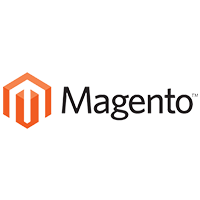You have your product, you have developed your branding, you know what you need to do but what online eCommerce platform is best for you? Don’t get caught up in over-elaborate platform structure from a lack of research or needing a new website to deal with your product expansion.
Here we take a look at the positives and negatives of Magento, WooCommerce (WordPress), Shopify and DNN (DotNetNuke). We will cover cost, usability and set up time so you can choose which platform best for your business.

Magento is great for bigger business’ who have a high volume of items, despite the fact that it’s the best for customisation, it’s also a complex framework which can to the platform being time consuming to implement. Magento is designed to be scalable from 10 products to over 10,000 products which makes it the ideal choice for expanding business’ looking to launch more product lines. The platform is also useful for global companies as it can use multiple languages and currencies as well as showing multi-shop fronts.
A consequence of the size of the platform, means it does need its own dedicated hosting server which is more costly than shared servers. Additionally, the platforms premium versions are expensive and coinciding with the complexity of the system, the added time required to complete tasks results in higher development costs. Due to the complexity of the platform, it can also be difficult to find a Magento specialist, further adding to the platform requirements.

Shopify is a multi-channel eCommerce platform, best suited to small-to-medium sized business’. It is intended to be utilized over numerous business channels, including web, mobile, social media, marketplaces, physical sale locations, and pop-up shops. However Shopify limits the volume of product attributes you can assign. Customisation on Shopify is complex and has limited number of options compared to other platforms. Furthermore you can only use one payment provider with a limited number of currencies without using a paid 3rd party application.

WooCommerce is the eCommerce plugin for the WordPress platform, meaning you need WordPress installed to use WooCommerce. Yet the integration with WordPress provides WooCommerce with the reliability and usability functions associated with WordPress and all its other plugins. This combination may require you to buy multiple plugins to customise the website how you want. In essence, WooCommerce is a system formed of a group of plugins all working together to allow the user the customisation and flexibility to expand a business without requiring a new website for every new product range. Unfortunately this reliance of multiple plugin’s does cause security issues as it requires each plugin to maintain security standards.
DNN (DOTNETNUKE)

DNN has a great versatility for allowing many different uses to manage and edit a website whilst having one administrator to approve specific edits. This functions revolves around have a very easy to use editing system which can also assist with SEO. Unfortunately DNN does not have as many plugins available compared to the other platforms and the available plugins are more expensive. However it does have a lot of unique features, making it very easy to use during development.
We at Dysc IT Solutions acknowledge there are many positives and negatives for each platform, the core answer to decide which platform you use, depends on what type of online store you’re looking to produce, whether you’re looking to expand and what your audience need to be able to perform. Below is a summary table to help you choose what is right for your business.
Summary
| Positives | Negatives | Business Type | |
| Magento | Multi language
Multi-currencies Multi store fronts available Ability to customise everything Scalable-built for 10 product or 10,000 |
Expensive for premium accounts and functions
Complexity in system results in longer to perform customisations Needs dedicated hosting server which can be costly |
Bigger business’ or business’ expecting a large expansion |
| WooCommerce | Ability to create exactly what you want with all the available plugins.
Reliability of a WordPress website Site can be expanded in relation to business size Easy to use and manage |
Requires purchase or free download of plugin for every function
High possibility of security issues with multi-dependent plugins. |
All business’ sizes |
| Shopify | Easy to use
Incorporation of multi-selling channels Can use 3rd party apps for extra functions and features ‘The Shopify Buy button’ |
Only 3 account types available
Difficult to amend fields Only features one payment option without embedding expensive add-on’s Complicated to add additional items to drop down menus |
Small to medium which have a long term plan to expand but not instant growth |
| DNN | Multiple users can manage account
Easy to edit and develop Simple editing makes it useful for SEO Lots of features ‘Out of the box’ |
Limited plugin options
Plugins can be more expensive |
Medium to large business’ that want bespoke website with multiple user access |
Author
Ben Care – Marketing Manager @ Dysc IT Solutions – www.dysc.co.uk
We are experts in website and software developments.
Leave a Reply